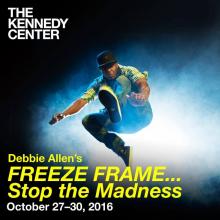jordan davis
The project which Allen spoke of, titled Freeze Frame…Stop the Madness, is a work of theatre written, choreographed, and directed by Allen that combines cinema, dance, and music into a stage performance inspired by the issues of race and gun violence in America. Freeze Frame opened at the Kennedy Center for the Performing Arts in Washington, D.C. on Oct. 27 and, on Oct. 24, Allen visited the Center for American Progress, in the nation’s capital, to discuss Freeze Frame’s creation and the impact she hopes the show will have on the U.S.
One of the greatest sermons I ever heard on the subject of communion was offered by the head pastor of a Christian Missionary Alliance church in Princeton, N.J., back in the late 1980s. This pastor spent most of that sermon talking about the cross and how Jesus’ body was literally broken. I can still hear the crunch of the nails going into Jesus’ wrists that I heard in my mind’s ear that Sunday. And this wasn’t Easter week. It was just a communion Sunday.
Toward the end of his sermon, the pastor brought out a piece of saltine cracker that lay in the communion plate. He cracked it and then he said this: “Every time I take communion I hear the crack of the bread in my mouth and I bite and remember the crack of Jesus’ bones … and I remember that I did that.”
I wept as we took communion that day.
But isn’t that really about dis-union — the dis-union of Christ’s actual physical body? The cracking of his bones, the breaking of his legs, the piercing of his flesh; the cross seems to be more about a breaking apart than a bringing together of Christ’s body.
Right now when I see the lived reality of the church in our world, it seems we are more in a state of dis-union than communion.
The problem is the systemic injustice inherent in Stand Your Ground laws: just feeling like you are being threatened can justify your response in “self-defense.” Under Florida self-defense laws now, someone can use even lethal force if they “reasonably believe” it is necessary to defend their lives or avoid great harm. How does a jury decide what a “reasonable person” would do under all the circumstances? Even if Dunn really believed there was a gun in the black teenagers’ car and there wasn’t one, he could still be justified in shooting into the car according to Stand Your Ground. The New York Times quoted Mary Anne Franks, an associate law professor at the University of Miami saying, “This trial is indicative of how much of a problem Stand Your Ground laws really do create … By the time you have an incident like this and ask a jury to look at the facts, it’s difficult to re-create the situation and determine the reasonableness of a defendant’s fear.” And unfortunately, the law creates an opportunity for racial factors — whether they’re conscious or not — to trump facts when even one juror who is sympathetic to a defendant’s “reasonable” fear can prevent prosecution.



